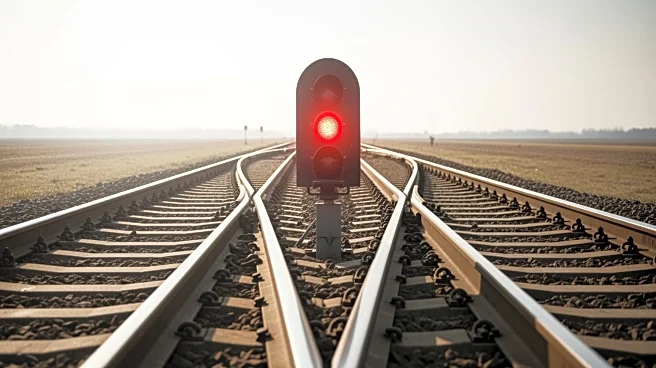What's Happening?
A bipartisan group of U.S. senators, led by John Hoeven (R-N.D.) and Amy Klobuchar (D-Minn.), has called on the Surface Transportation Board (STB) to closely examine the proposed merger between Union Pacific and Norfolk Southern. The senators emphasized
the need for the merger to demonstrate long-term competition improvements in the freight rail sector. The letter, co-signed by several other senators including Roger Marshall (R-Kan.), highlights concerns that the merger could lead to a single entity controlling over 40% of U.S. freight rail traffic, potentially affecting agricultural producers and other industries reliant on timely rail service. The STB's post-2001 'Major Rail Consolidation Procedures' require that such mergers enhance competition, a standard that the proposed merger must meet.
Why It's Important?
The proposed merger between Union Pacific and Norfolk Southern is significant due to its potential impact on the U.S. freight rail industry. If approved, the merger could consolidate a substantial portion of the rail market, raising concerns about reduced competition and service reliability. This is particularly critical for industries such as agriculture, which depend on efficient rail service for time-sensitive shipments. The merger's approval could set a precedent under the STB's 2001 rules, influencing future rail consolidations. Stakeholders like the Freight Rail Customer Alliance have expressed opposition, citing past experiences of increased rates and unreliable service following rail consolidations.
What's Next?
The STB will need to conduct a thorough review of the merger proposal, considering the potential impacts on competition and service quality. Industry groups and stakeholders are likely to continue voicing their concerns, and the STB's decision will be closely watched as it could influence the future landscape of the U.S. rail industry. The outcome may also affect regulatory approaches to rail mergers, particularly regarding competition and service standards.
Beyond the Headlines
The merger raises broader questions about the balance between efficiency and competition in the rail industry. While proponents argue that the merger could lead to cost savings and improved service, critics warn of the risks associated with reduced competition. The decision could have long-term implications for regulatory policies and the structure of the rail industry, potentially affecting market dynamics and service quality for years to come.















